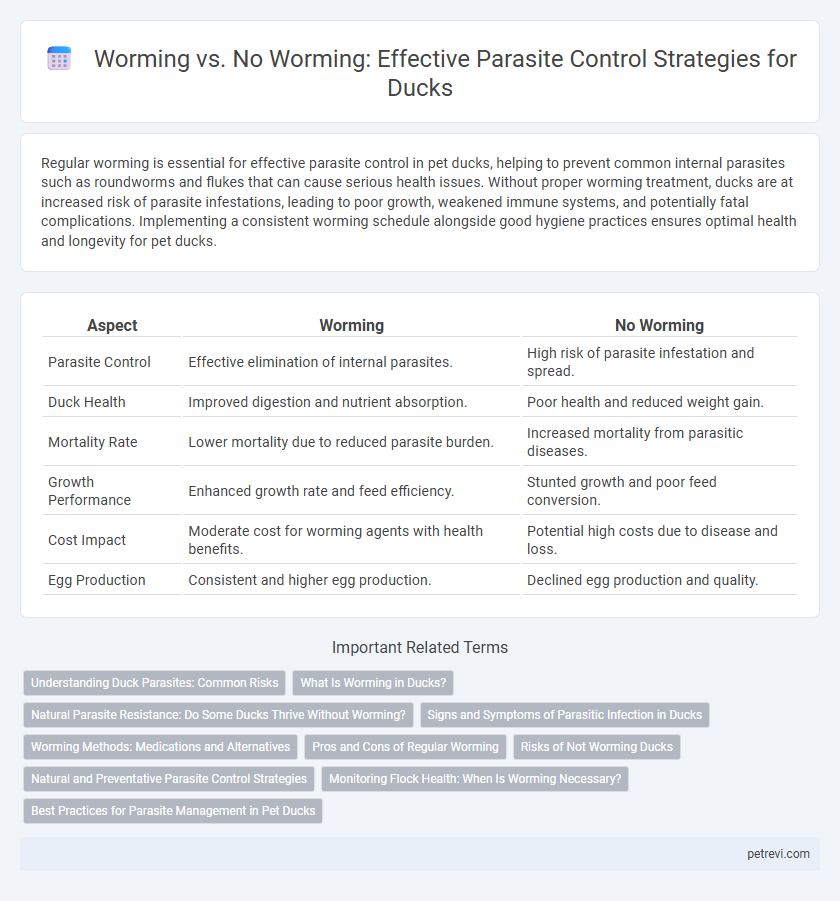Regular worming is essential for effective parasite control in pet ducks, helping to prevent common internal parasites such as roundworms and flukes that can cause serious health issues. Without proper worming treatment, ducks are at increased risk of parasite infestations, leading to poor growth, weakened immune systems, and potentially fatal complications. Implementing a consistent worming schedule alongside good hygiene practices ensures optimal health and longevity for pet ducks.
Table of Comparison
| Aspect | Worming | No Worming |
|---|---|---|
| Parasite Control | Effective elimination of internal parasites. | High risk of parasite infestation and spread. |
| Duck Health | Improved digestion and nutrient absorption. | Poor health and reduced weight gain. |
| Mortality Rate | Lower mortality due to reduced parasite burden. | Increased mortality from parasitic diseases. |
| Growth Performance | Enhanced growth rate and feed efficiency. | Stunted growth and poor feed conversion. |
| Cost Impact | Moderate cost for worming agents with health benefits. | Potential high costs due to disease and loss. |
| Egg Production | Consistent and higher egg production. | Declined egg production and quality. |
Understanding Duck Parasites: Common Risks
Duck parasites, including roundworms, gapeworms, and flukes, pose significant health risks such as respiratory distress, weight loss, and weakened immunity. Regular worming treatments effectively reduce parasite loads, preventing outbreaks and promoting optimal growth and egg production. Skipping worming increases vulnerability to parasite-induced diseases, leading to poor flock performance and higher mortality rates.
What Is Worming in Ducks?
Worming in ducks involves administering anthelmintic treatments to eliminate internal parasites such as roundworms, tapeworms, and gapeworms, which can impair their health and growth. Regular worming improves nutrient absorption, enhances immune function, and prevents common issues like weight loss and respiratory distress caused by parasitic infestations. Without worming, ducks are at higher risk of parasite buildup, leading to decreased productivity and increased vulnerability to secondary infections.
Natural Parasite Resistance: Do Some Ducks Thrive Without Worming?
Certain duck breeds exhibit natural parasite resistance, allowing them to thrive without routine worming by developing robust immune responses to common intestinal parasites. Studies show heritage and wild-type ducks maintain low parasite loads through natural behaviors like foraging and dust bathing, which reduce parasite exposure and enhance gut health. Choosing worm-free management in these resilient populations can support sustainable farming by minimizing drug use and promoting ecological balance.
Signs and Symptoms of Parasitic Infection in Ducks
Ducks infected with parasites often exhibit signs such as weight loss, lethargy, and decreased appetite, while symptoms like diarrhea and feather loss can indicate severe infestation. Regular worming helps control internal parasites like roundworms and flukes, reducing health risks and improving overall duck vitality. Without worming, parasite burdens can cause anemia, respiratory distress, and compromised immune function, leading to poor growth and increased mortality rates.
Worming Methods: Medications and Alternatives
Effective duck parasite control involves worming methods that include both medications and alternative treatments. Anthelmintic medications such as fenbendazole and praziquantel target internal parasites like roundworms and flukes, while herbal remedies and diatomaceous earth provide non-chemical options to reduce parasite loads naturally. Regular monitoring and combining these approaches can optimize health outcomes and minimize resistance risks in ducks.
Pros and Cons of Regular Worming
Regular worming in ducks effectively reduces parasite loads such as roundworms and tapeworms, enhancing overall health and egg production. However, overuse of anthelmintics can lead to drug resistance and potential disruption of beneficial gut flora. Balancing treatment frequency with targeted parasite monitoring ensures optimal duck welfare and sustainable parasite control.
Risks of Not Worming Ducks
Neglecting to worm ducks regularly significantly increases the risk of parasitic infestations such as roundworms and flukes, which can lead to weight loss, decreased egg production, and even mortality. Uncontrolled parasites impair nutrient absorption and weaken the immune system, making ducks more vulnerable to secondary infections. Failure to implement a consistent deworming schedule ultimately compromises duck health and farm productivity.
Natural and Preventative Parasite Control Strategies
Worming in ducks involves administering anthelmintics to eliminate internal parasites, but relying solely on medication can lead to resistance and disrupt natural gut flora. Natural and preventative parasite control strategies include maintaining clean water sources, rotating grazing areas to break parasite life cycles, and providing access to natural foraging that helps ducks self-medicate through ingestion of plants with antiparasitic properties. Integrating biosecurity measures such as proper sanitation and promoting a balanced diet rich in vitamins and minerals enhances ducks' immune response to resist parasitic infections without overdependence on chemical wormers.
Monitoring Flock Health: When Is Worming Necessary?
Effective monitoring of flock health is crucial in determining when worming is necessary for ducks, as overuse of anthelmintics can lead to resistance and environmental impact. Regular fecal egg counts and observing clinical signs such as weight loss, decreased egg production, or lethargy allow targeted treatment to control internal parasites like gapeworms and roundworms. Strategic worming based on monitoring helps maintain duck health and productivity while minimizing chemical interventions.
Best Practices for Parasite Management in Pet Ducks
Effective parasite management in pet ducks involves regular worming with appropriately dosed anthelmintics to reduce intestinal worm loads and prevent health complications. Avoiding worming can lead to heavy parasite infestations causing weight loss, anemia, and reduced egg production. Integrating clean living environments, rotational grazing, and periodic fecal examinations enhances parasite control and supports overall duck health.
Worming vs No worming for Duck parasite control Infographic

 petrevi.com
petrevi.com